Commander Synergies
Discover cards that synergize perfectly with your Commander.
Synergy
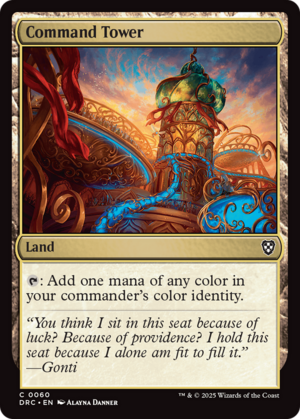
Card Details
Info
| Color: | |
| Identifies: | |
| Cost: | |
| Rarity: | Common |
| Converted Cost: | 0 |
| Power/Toughness: | / |
| Types: | |
| SubTypes: | |
| Languages: | 
          |
| Layout: | Normal |
| Rank: | |
| Saltiness: |
Rules
Text
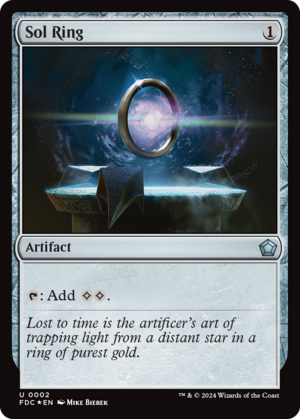
Card Details
Info
| Color: | |
| Identifies: | |
| Cost: |
|
| Rarity: | Uncommon |
| Converted Cost: | 1 |
| Power/Toughness: | / |
| Types: | |
| SubTypes: | |
| Languages: | 
         |
| Layout: | Normal |
| Rank: | |
| Saltiness: |
Rules
Text
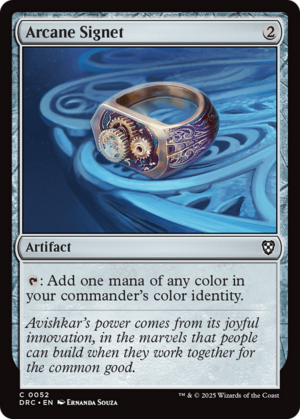
Card Details
Info
| Color: | |
| Identifies: | |
| Cost: |
|
| Rarity: | Common |
| Converted Cost: | 2 |
| Power/Toughness: | / |
| Types: | |
| SubTypes: | |
| Languages: | 
          |
| Layout: | Normal |
| Rank: | |
| Saltiness: |
Rules
Text
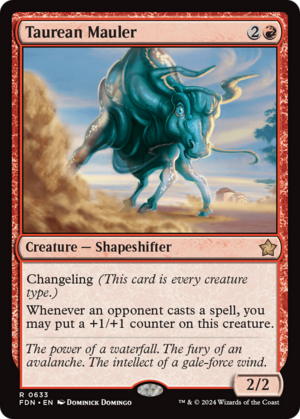
Card Details
Info
| Color: | |
| Identifies: | |
| Cost: |
|
| Rarity: | Rare |
| Converted Cost: | 3 |
| Power/Toughness: | 2/2 |
| Types: | |
| SubTypes: | |
| Languages: | 
         |
| Layout: | Normal |
| Rank: | |
| Saltiness: |
Abilities/Keywords
Rules
Text
Changeling (This card is every creature type.) Whenever an opponent casts a spell, you may put a +1/+1counteron this creature.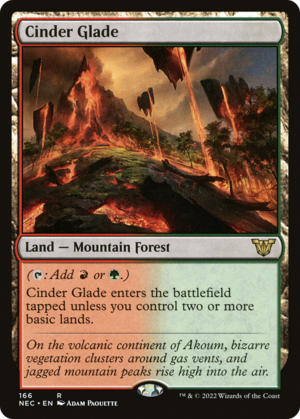
Card Details
Info
| Color: | |
| Identifies: | |
| Cost: | |
| Rarity: | Rare |
| Converted Cost: | 0 |
| Power/Toughness: | / |
| Types: | |
| SubTypes: | |
| Languages: | 
          |
| Layout: | Normal |
| Rank: | |
| Saltiness: |
Rules
Prices
Legalities
Standardbrawl
Vintage
Timeless
Duel
Future
Pauper
Pioneer
Legacy
Gladiator
Brawl
Predh
Paupercommander
Modern
Standard
Commander
Oathbreaker
Oldschool
Historic
Alchemy
Penny
Premodern
Text
(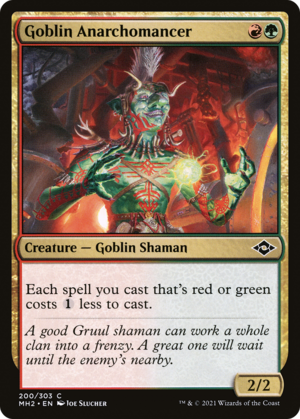
Card Details
Info
| Color: | |
| Identifies: | |
| Cost: |
|
| Rarity: | Common |
| Converted Cost: | 2 |
| Power/Toughness: | 2/2 |
| Types: | |
| SubTypes: | |
| Languages: | 
          |
| Layout: | Normal |
| Rank: | |
| Saltiness: |
Rules
Prices
Legalities
Standardbrawl
Vintage
Timeless
Duel
Future
Pauper
Pioneer
Legacy
Gladiator
Brawl
Predh
Paupercommander
Modern
Standard
Commander
Oathbreaker
Oldschool
Historic
Alchemy
Penny
Premodern
Text
Each spell you cast that's red or green costs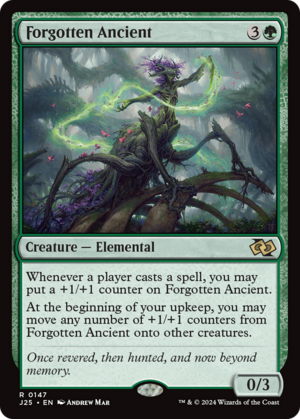
Card Details
Info
| Color: | |
| Identifies: | |
| Cost: |
|
| Rarity: | Rare |
| Converted Cost: | 4 |
| Power/Toughness: | 0/3 |
| Types: | |
| SubTypes: | |
| Languages: | 
         |
| Layout: | Normal |
| Rank: | |
| Saltiness: |
Rules
Text
Whenever a player casts a spell, you may put a +1/+1counteron this creature. At the beginning of your upkeep, you may move any number of +1/+1 counters from this creature onto other creatures.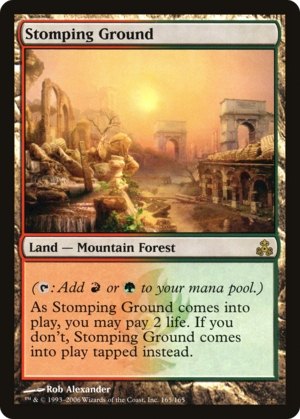
Card Details
Info
| Color: | |
| Identifies: | |
| Cost: | |
| Rarity: | Rare |
| Converted Cost: | 0 |
| Power/Toughness: | / |
| Types: | |
| SubTypes: | |
| Languages: | 
          |
| Layout: | Normal |
| Rank: | |
| Saltiness: |
Rules
Prices
Legalities
Standardbrawl
Vintage
Timeless
Duel
Future
Pauper
Pioneer
Legacy
Gladiator
Brawl
Predh
Paupercommander
Modern
Standard
Commander
Oathbreaker
Oldschool
Historic
Alchemy
Penny
Premodern
Text
(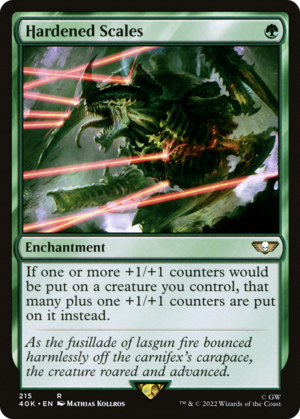
Card Details
Info
| Color: | |
| Identifies: | |
| Cost: |
|
| Rarity: | Rare |
| Converted Cost: | 1 |
| Power/Toughness: | / |
| Types: | |
| SubTypes: | |
| Languages: | 
          |
| Layout: | Normal |
| Rank: | |
| Saltiness: |
Rules
Prices
Legalities
Standardbrawl
Vintage
Timeless
Duel
Future
Pauper
Pioneer
Legacy
Gladiator
Brawl
Predh
Paupercommander
Modern
Standard
Commander
Oathbreaker
Oldschool
Historic
Alchemy
Penny
Premodern
Text
If one or more +1/+1 counters would be put on a creature you control, that many plus one +1/+1 counters are put on it instead.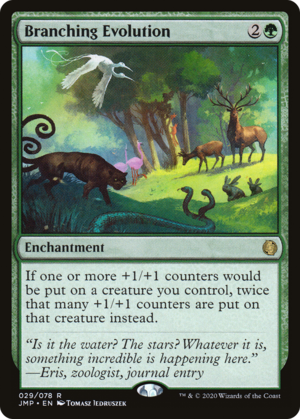
Card Details
Info
| Color: | |
| Identifies: | |
| Cost: |
|
| Rarity: | Rare |
| Converted Cost: | 3 |
| Power/Toughness: | / |
| Types: | |
| SubTypes: | |
| Languages: | 
       |
| Layout: | Normal |
| Rank: | |
| Saltiness: |
Rules
Prices
Legalities
Standardbrawl
Vintage
Timeless
Duel
Future
Pauper
Pioneer
Legacy
Gladiator
Brawl
Predh
Paupercommander
Modern
Standard
Commander
Oathbreaker
Oldschool
Historic
Alchemy
Penny
Premodern
Text
If one or more +1/+1 counters would be put on a creature you control, twice that many +1/+1 counters are put on that creature instead.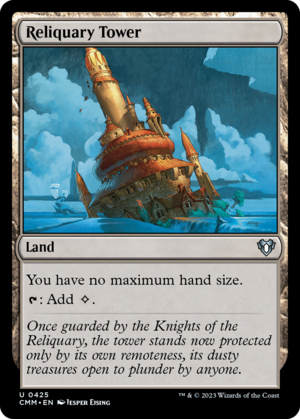
Card Details
Info
| Color: | |
| Identifies: | |
| Cost: | |
| Rarity: | Uncommon |
| Converted Cost: | 0 |
| Power/Toughness: | / |
| Types: | |
| SubTypes: | |
| Languages: | 
          |
| Layout: | Normal |
| Rank: | |
| Saltiness: |
Rules
Prices
Legalities
Standardbrawl
Vintage
Timeless
Duel
Future
Pauper
Pioneer
Legacy
Gladiator
Brawl
Predh
Paupercommander
Modern
Standard
Commander
Oathbreaker
Oldschool
Historic
Alchemy
Penny
Premodern
Text
You have no maximum hand size.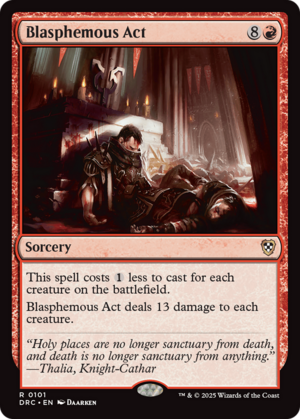
Card Details
Info
| Color: | |
| Identifies: | |
| Cost: |
|
| Rarity: | Rare |
| Converted Cost: | 9 |
| Power/Toughness: | / |
| Types: | |
| SubTypes: | |
| Languages: | 
          |
| Layout: | Normal |
| Rank: | |
| Saltiness: |
Rules
Text
This spell costs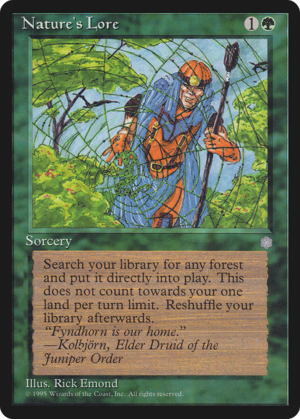
Card Details
Info
| Color: | |
| Identifies: | |
| Cost: |
|
| Rarity: | Uncommon |
| Converted Cost: | 2 |
| Power/Toughness: | / |
| Types: | |
| SubTypes: | |
| Languages: | 
          |
| Layout: | Normal |
| Rank: | |
| Saltiness: |
Rules
Text
Search your library for a Forest card, put that card onto the battlefield, thenshuffle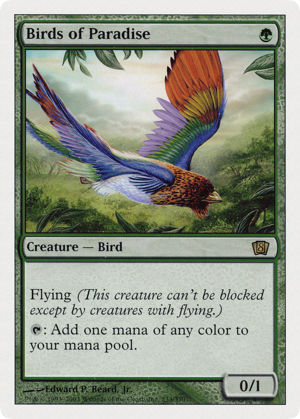
Card Details
Info
| Color: | |
| Identifies: | |
| Cost: |
|
| Rarity: | Rare |
| Converted Cost: | 1 |
| Power/Toughness: | 0/1 |
| Types: | |
| SubTypes: | |
| Languages: | 
          |
| Layout: | Normal |
| Rank: | |
| Saltiness: |
Abilities/Keywords
Rules
Prices
| Seller | Price |
|---|---|
| Cardkingdom | / 449.99 USD 16.99 USD |
| Cardmarket | 5.49 EUR / 120.47 EUR |
| Tcgplayer | 11.68 USD / 219.99 USD |
Legalities
Standardbrawl
Vintage
Timeless
Duel
Future
Pauper
Pioneer
Legacy
Gladiator
Brawl
Predh
Paupercommander
Modern
Standard
Commander
Oathbreaker
Oldschool
Historic
Alchemy
Penny
Premodern
Text
Flying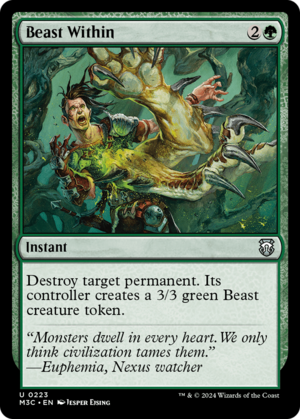
Card Details
Info
| Color: | |
| Identifies: | |
| Cost: |
|
| Rarity: | Uncommon |
| Converted Cost: | 3 |
| Power/Toughness: | / |
| Types: | |
| SubTypes: | |
| Languages: | 
         |
| Layout: | Normal |
| Rank: | |
| Saltiness: | |
| Tokens: |
Rules
Prices
Legalities
Standardbrawl
Vintage
Timeless
Duel
Future
Pauper
Pioneer
Legacy
Gladiator
Brawl
Predh
Paupercommander
Modern
Standard
Commander
Oathbreaker
Oldschool
Historic
Alchemy
Penny
Premodern
Text
Destroy target permanent. Its controller creates a 3/3 green Beast creature token.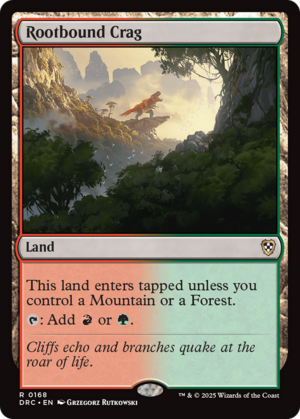
Card Details
Info
| Color: | |
| Identifies: | |
| Cost: | |
| Rarity: | Rare |
| Converted Cost: | 0 |
| Power/Toughness: | / |
| Types: | |
| SubTypes: | |
| Languages: | 
          |
| Layout: | Normal |
| Rank: | |
| Saltiness: |
Rules
Text
This land enters tapped unless you control a Mountain or a Forest.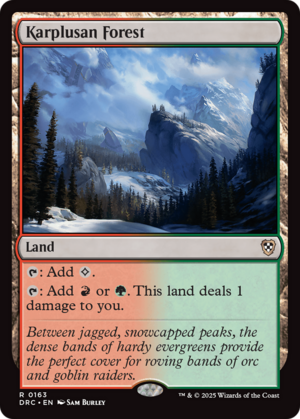
Card Details
Info
| Color: | |
| Identifies: | |
| Cost: | |
| Rarity: | Rare |
| Converted Cost: | 0 |
| Power/Toughness: | / |
| Types: | |
| SubTypes: | |
| Languages: | 
        |
| Layout: | Normal |
| Rank: | |
| Saltiness: |
Rules
Text
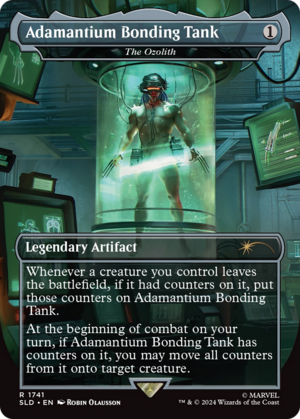
Card Details
Info
| Color: | |
| Identifies: | |
| Cost: |
|
| Rarity: | Rare |
| Converted Cost: | 1 |
| Power/Toughness: | / |
| Types: | |
| SubTypes: | |
| Languages: | 
          |
| Layout: | Normal |
| Rank: | |
| Saltiness: |
Rules
Prices
Legalities
Standardbrawl
Vintage
Timeless
Duel
Future
Pauper
Pioneer
Legacy
Gladiator
Brawl
Predh
Paupercommander
Modern
Standard
Commander
Oathbreaker
Oldschool
Historic
Alchemy
Penny
Premodern
Text
Whenever a creature you control leaves the battlefield, if it had counters on it, put those counters on The Ozolith. At the beginning of combat on your turn, if The Ozolith has counters on it, you may move all counters from The Ozolith onto target creature.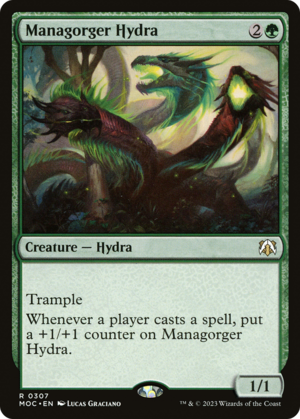
Card Details
Info
| Color: | |
| Identifies: | |
| Cost: |
|
| Rarity: | Rare |
| Converted Cost: | 3 |
| Power/Toughness: | 1/1 |
| Types: | |
| SubTypes: | |
| Languages: | 
          |
| Layout: | Normal |
| Rank: | |
| Saltiness: |
Abilities/Keywords
Rules
Text
Trample Whenever a player casts a spell, put a +1/+1counteron this creature.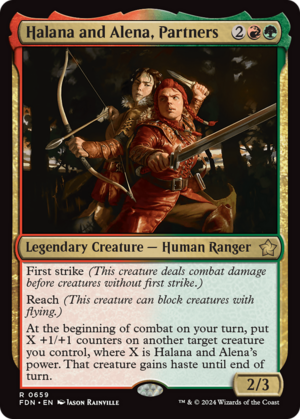
Card Details
Info
| Color: | |
| Identifies: | |
| Cost: |
|
| Rarity: | Rare |
| Converted Cost: | 4 |
| Power/Toughness: | 2/3 |
| Types: | |
| SubTypes: | |
| Languages: | 
          |
| Layout: | Normal |
| Rank: | |
| Saltiness: |
Abilities/Keywords
Rules
Text
First strike (This creature deals combat damage before creatures without first strike.) Reach (This creature can block creatures with flying.) At the beginning of combat on your turn, put X +1/+1 counters on another target creature you control, where X is Halana and Alena's power. That creature gains haste until end of turn.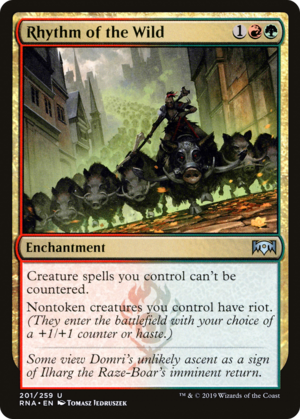
Card Details
Info
| Color: | |
| Identifies: | |
| Cost: |
|
| Rarity: | Uncommon |
| Converted Cost: | 3 |
| Power/Toughness: | / |
| Types: | |
| SubTypes: | |
| Languages: | 
          |
| Layout: | Normal |
| Rank: | |
| Saltiness: |
Rules
Prices
Legalities
Standardbrawl
Vintage
Timeless
Duel
Future
Pauper
Pioneer
Legacy
Gladiator
Brawl
Predh
Paupercommander
Modern
Standard
Commander
Oathbreaker
Oldschool
Historic
Alchemy
Penny
Premodern
Text
Creature spells you control can't be countered. Nontoken creatures you control have riot. (They enter with your choice of a +1/+1counteror haste.)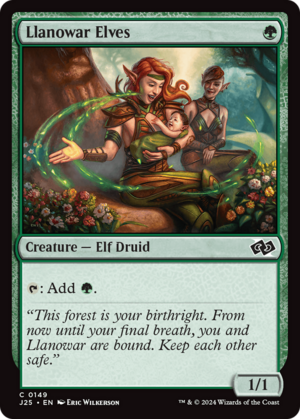
Card Details
Info
| Color: | |
| Identifies: | |
| Cost: |
|
| Rarity: | Common |
| Converted Cost: | 1 |
| Power/Toughness: | 1/1 |
| Types: | |
| SubTypes: | |
| Languages: | 
          |
| Layout: | Normal |
| Rank: | |
| Saltiness: |
Rules
Text
Less Synergy
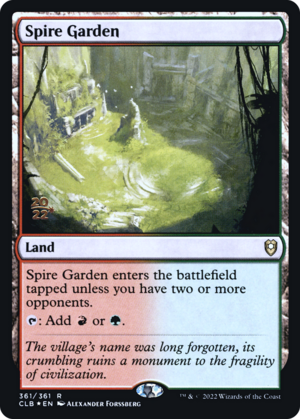
Card Details
Info
| Color: | |
| Identifies: | |
| Cost: | |
| Rarity: | Rare |
| Converted Cost: | 0 |
| Power/Toughness: | / |
| Types: | |
| SubTypes: | |
| Languages: | 
          |
| Layout: | Normal |
| Rank: | |
| Saltiness: |
Rules
Prices
Legalities
Standardbrawl
Vintage
Timeless
Duel
Future
Pauper
Pioneer
Legacy
Gladiator
Brawl
Predh
Paupercommander
Modern
Standard
Commander
Oathbreaker
Oldschool
Historic
Alchemy
Penny
Premodern
Text
This land enters tapped unless you have two or more opponents.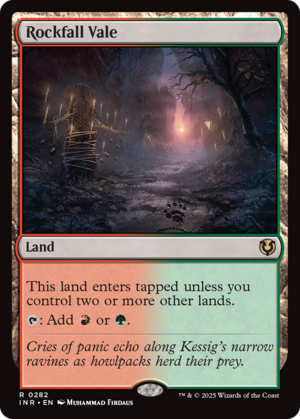
Card Details
Info
| Color: | |
| Identifies: | |
| Cost: | |
| Rarity: | Rare |
| Converted Cost: | 0 |
| Power/Toughness: | / |
| Types: | |
| SubTypes: | |
| Languages: | 
          |
| Layout: | Normal |
| Rank: | |
| Saltiness: |
Rules
Prices
Legalities
Standardbrawl
Vintage
Timeless
Duel
Future
Pauper
Pioneer
Legacy
Gladiator
Brawl
Predh
Paupercommander
Modern
Standard
Commander
Oathbreaker
Oldschool
Historic
Alchemy
Penny
Premodern
Text
This land enters tapped unless you control two or more other lands.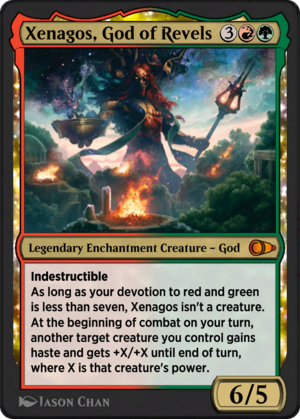
Card Details
Info
| Color: | |
| Identifies: | |
| Cost: |
|
| Rarity: | Mythic |
| Converted Cost: | 5 |
| Power/Toughness: | 6/5 |
| Types: | |
| SubTypes: | |
| Languages: | 
          |
| Layout: | Normal |
| Rank: | |
| Saltiness: |
Abilities/Keywords
Rules
Prices
| Seller | Price |
|---|
Legalities
Standardbrawl
Vintage
Timeless
Duel
Future
Pauper
Pioneer
Legacy
Gladiator
Brawl
Predh
Paupercommander
Modern
Standard
Commander
Oathbreaker
Oldschool
Historic
Alchemy
Penny
Premodern
Text
Indestructible As long as your devotion to red and green is less than seven, Xenagos isn't a creature. At the beginning of combat on your turn, another target creature you control gains haste and gets +X/+X until end of turn, where X is that creature's power.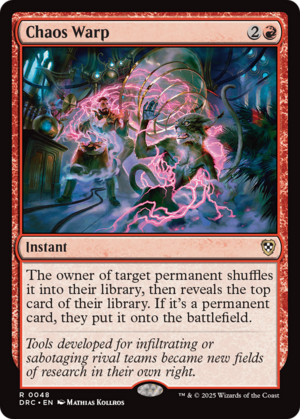
Card Details
Info
| Color: | |
| Identifies: | |
| Cost: |
|
| Rarity: | Rare |
| Converted Cost: | 3 |
| Power/Toughness: | / |
| Types: | |
| SubTypes: | |
| Languages: | 
         |
| Layout: | Normal |
| Rank: | |
| Saltiness: |
Rules
Text
The owner of target permanent shuffles it into their library, then reveals the top card of their library. If it's a permanent card, they put it onto the battlefield.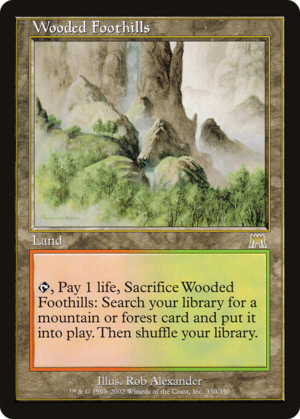
Card Details
Info
| Color: | |
| Identifies: | |
| Cost: | |
| Rarity: | Rare |
| Converted Cost: | 0 |
| Power/Toughness: | / |
| Types: | |
| SubTypes: | |
| Languages: | 
          |
| Layout: | Normal |
| Rank: | |
| Saltiness: |
Rules
Prices
| Seller | Price |
|---|---|
| Manapool | 66.79 USD / 400.01 USD |
| Tcgplayer | / 720 USD 82.1 USD |
| Cardmarket | / 484.08 EUR 56.37 EUR |
Legalities
Standardbrawl
Vintage
Timeless
Duel
Future
Pauper
Pioneer
Legacy
Gladiator
Brawl
Predh
Paupercommander
Modern
Standard
Commander
Oathbreaker
Oldschool
Historic
Alchemy
Penny
Premodern
Text
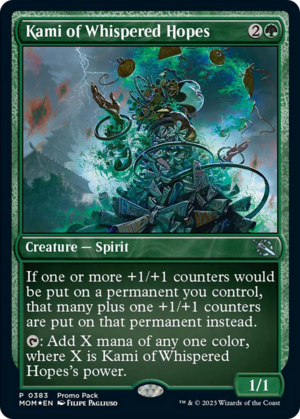
Card Details
Info
| Color: | |
| Identifies: | |
| Cost: |
|
| Rarity: | Uncommon |
| Converted Cost: | 3 |
| Power/Toughness: | 1/1 |
| Types: | |
| SubTypes: | |
| Languages: | 
       |
| Layout: | Normal |
| Rank: | |
| Saltiness: |
Rules
Prices
Legalities
Standardbrawl
Vintage
Timeless
Duel
Future
Pauper
Pioneer
Legacy
Gladiator
Brawl
Predh
Paupercommander
Modern
Standard
Commander
Oathbreaker
Oldschool
Historic
Alchemy
Penny
Premodern
Text
If one or more +1/+1 counters would be put on a permanent you control, that many plus one +1/+1 counters are put on that permanent instead.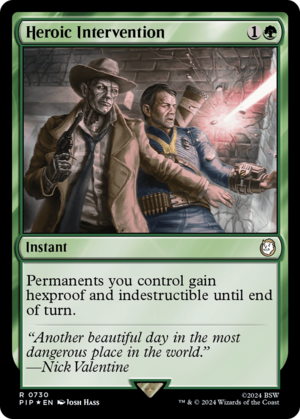
Card Details
Info
| Color: | |
| Identifies: | |
| Cost: |
|
| Rarity: | Rare |
| Converted Cost: | 2 |
| Power/Toughness: | / |
| Types: | |
| SubTypes: | |
| Languages: | 
          |
| Layout: | Normal |
| Rank: | |
| Saltiness: |
Rules
Text
Permanents you control gain hexproof and indestructible until end of turn.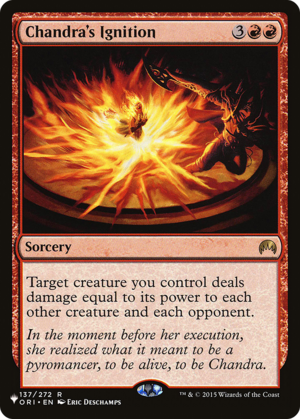
Card Details
Info
| Color: | |
| Identifies: | |
| Cost: |
|
| Rarity: | Rare |
| Converted Cost: | 5 |
| Power/Toughness: | / |
| Types: | |
| SubTypes: | |
| Languages: | 
          |
| Layout: | Normal |
| Rank: | |
| Saltiness: |
Rules
Text
Target creature you control deals damage equal to its power to each other creature and each opponent.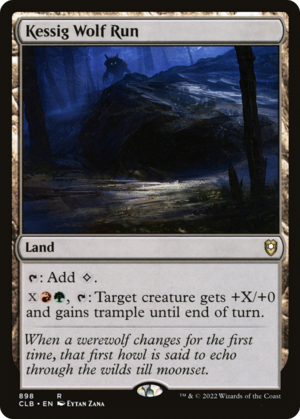
Card Details
Info
| Color: | |
| Identifies: | |
| Cost: | |
| Rarity: | Rare |
| Converted Cost: | 0 |
| Power/Toughness: | / |
| Types: | |
| SubTypes: | |
| Languages: | 
          |
| Layout: | Normal |
| Rank: | |
| Saltiness: |
Rules
Text

Card Details
Info
| Color: | |
| Identifies: | |
| Cost: |
|
| Rarity: | Common |
| Converted Cost: | 2 |
| Power/Toughness: | / |
| Types: | |
| SubTypes: | |
| Languages: | 
          |
| Layout: | Normal |
| Rank: | |
| Saltiness: |
Rules
Text
As an additional cost to cast this spell,sacrificea creature. Fling deals damage equal to the sacrificed creature's power to any target.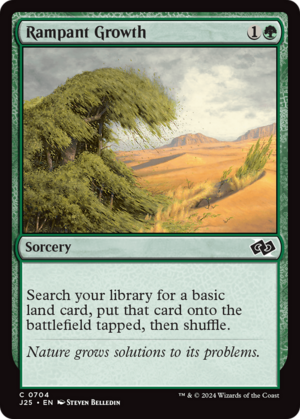
Card Details
Info
| Color: | |
| Identifies: | |
| Cost: |
|
| Rarity: | Common |
| Converted Cost: | 2 |
| Power/Toughness: | / |
| Types: | |
| SubTypes: | |
| Languages: | 
          |
| Layout: | Normal |
| Rank: | |
| Saltiness: |
Rules
Text
Search your library for a basic land card, put that card onto the battlefield tapped, thenshuffle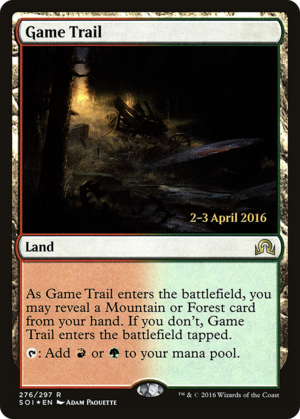
Card Details
Info
| Color: | |
| Identifies: | |
| Cost: | |
| Rarity: | Rare |
| Converted Cost: | 0 |
| Power/Toughness: | / |
| Types: | |
| SubTypes: | |
| Languages: | 
          |
| Layout: | Normal |
| Rank: | |
| Saltiness: |
Rules
Prices
Legalities
Standardbrawl
Vintage
Timeless
Duel
Future
Pauper
Pioneer
Legacy
Gladiator
Brawl
Predh
Paupercommander
Modern
Standard
Commander
Oathbreaker
Oldschool
Historic
Alchemy
Penny
Premodern
Text
As this land enters, you may reveal a Mountain or Forest card from your hand. If you don't, this land enters tapped.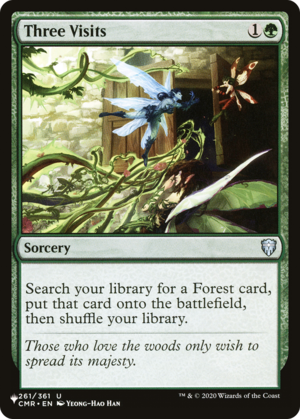
Card Details
Info
| Color: | |
| Identifies: | |
| Cost: |
|
| Rarity: | Uncommon |
| Converted Cost: | 2 |
| Power/Toughness: | / |
| Types: | |
| SubTypes: | |
| Languages: | 
         |
| Layout: | Normal |
| Rank: | |
| Saltiness: |
Rules
Text
Search your library for a Forest card, put it onto the battlefield, thenshuffle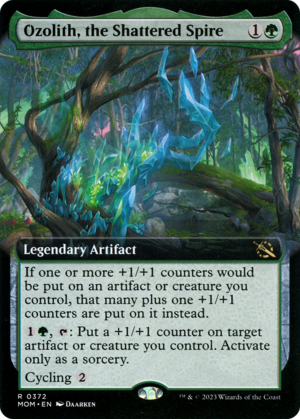
Card Details
Info
| Color: | |
| Identifies: | |
| Cost: |
|
| Rarity: | Rare |
| Converted Cost: | 2 |
| Power/Toughness: | / |
| Types: | |
| SubTypes: | |
| Languages: | 
       |
| Layout: | Normal |
| Rank: | |
| Saltiness: |
Abilities/Keywords
Rules
Prices
Legalities
Standardbrawl
Vintage
Timeless
Duel
Future
Pauper
Pioneer
Legacy
Gladiator
Brawl
Predh
Paupercommander
Modern
Standard
Commander
Oathbreaker
Oldschool
Historic
Alchemy
Penny
Premodern
Text
If one or more +1/+1 counters would be put on an artifact or creature you control, that many plus one +1/+1 counters are put on it instead.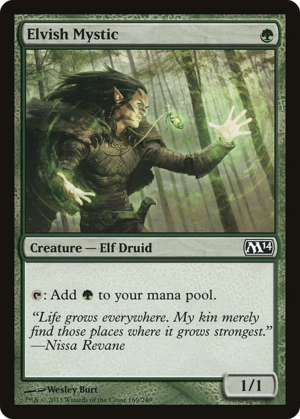
Card Details
Info
| Color: | |
| Identifies: | |
| Cost: |
|
| Rarity: | Common |
| Converted Cost: | 1 |
| Power/Toughness: | 1/1 |
| Types: | |
| SubTypes: | |
| Languages: | 
          |
| Layout: | Normal |
| Rank: | |
| Saltiness: |
Rules
Prices
Legalities
Standardbrawl
Vintage
Timeless
Duel
Future
Pauper
Pioneer
Legacy
Gladiator
Brawl
Predh
Paupercommander
Modern
Standard
Commander
Oathbreaker
Oldschool
Historic
Alchemy
Penny
Premodern
Text
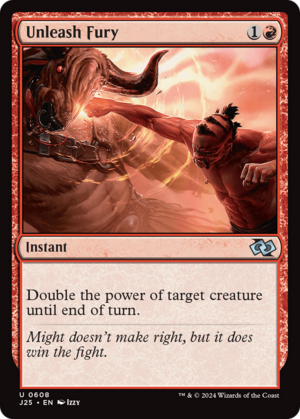
Card Details
Info
| Color: | |
| Identifies: | |
| Cost: |
|
| Rarity: | Uncommon |
| Converted Cost: | 2 |
| Power/Toughness: | / |
| Types: | |
| SubTypes: | |
| Languages: | 
          |
| Layout: | Normal |
| Rank: | |
| Saltiness: |
Rules
Text
Double the power of target creature until end of turn.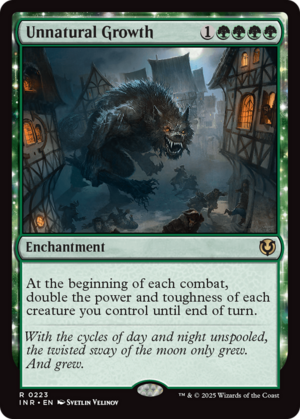
Card Details
Info
| Color: | |
| Identifies: | |
| Cost: |
|
| Rarity: | Rare |
| Converted Cost: | 5 |
| Power/Toughness: | / |
| Types: | |
| SubTypes: | |
| Languages: | 
          |
| Layout: | Normal |
| Rank: | |
| Saltiness: |
Rules
Prices
Legalities
Standardbrawl
Vintage
Timeless
Duel
Future
Pauper
Pioneer
Legacy
Gladiator
Brawl
Predh
Paupercommander
Modern
Standard
Commander
Oathbreaker
Oldschool
Historic
Alchemy
Penny
Premodern
Text
At the beginning of each combat, double the power and toughness of each creature you control until end of turn.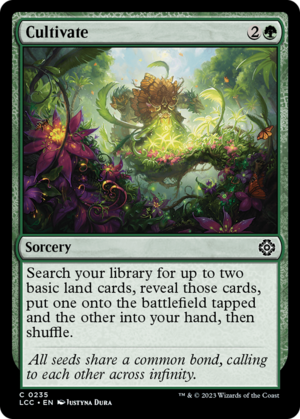
Card Details
Info
| Color: | |
| Identifies: | |
| Cost: |
|
| Rarity: | Common |
| Converted Cost: | 3 |
| Power/Toughness: | / |
| Types: | |
| SubTypes: | |
| Languages: | 
          |
| Layout: | Normal |
| Rank: | |
| Saltiness: |
Rules
Prices
Legalities
Standardbrawl
Vintage
Timeless
Duel
Future
Pauper
Pioneer
Legacy
Gladiator
Brawl
Predh
Paupercommander
Modern
Standard
Commander
Oathbreaker
Oldschool
Historic
Alchemy
Penny
Premodern
Text
Search your library for up to two basic land cards, reveal those cards, put one onto the battlefield tapped and the other into your hand, thenshuffle
Card Details
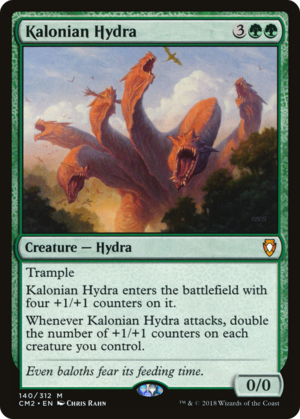
Card Details
Info
| Color: | |
| Identifies: | |
| Cost: |
|
| Rarity: | Mythic |
| Converted Cost: | 5 |
| Power/Toughness: | 0/0 |
| Types: | |
| SubTypes: | |
| Languages: | 
          |
| Layout: | Normal |
| Rank: | |
| Saltiness: |
Abilities/Keywords
Rules
Prices
Legalities
Standardbrawl
Vintage
Timeless
Duel
Future
Pauper
Pioneer
Legacy
Gladiator
Brawl
Predh
Paupercommander
Modern
Standard
Commander
Oathbreaker
Oldschool
Historic
Alchemy
Penny
Premodern
Text
Trample This creature enters with four +1/+1 counters on it. Whenever this creature attacks, double the number of +1/+1 counters on each creature you control.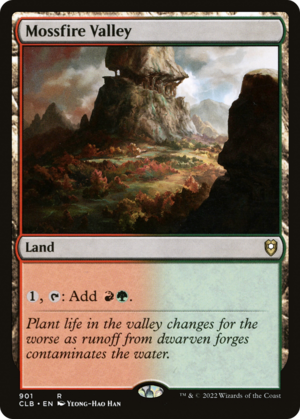
Card Details
Info
| Color: | |
| Identifies: | |
| Cost: | |
| Rarity: | Rare |
| Converted Cost: | 0 |
| Power/Toughness: | / |
| Types: | |
| SubTypes: | |
| Languages: | 
         |
| Layout: | Normal |
| Rank: | |
| Saltiness: |
Rules
Prices
Legalities
Standardbrawl
Vintage
Timeless
Duel
Future
Pauper
Pioneer
Legacy
Gladiator
Brawl
Predh
Paupercommander
Modern
Standard
Commander
Oathbreaker
Oldschool
Historic
Alchemy
Penny
Premodern
Text
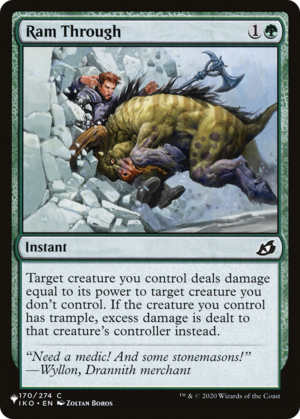
Card Details
Info
| Color: | |
| Identifies: | |
| Cost: |
|
| Rarity: | Common |
| Converted Cost: | 2 |
| Power/Toughness: | / |
| Types: | |
| SubTypes: | |
| Languages: | 
          |
| Layout: | Normal |
| Rank: | |
| Saltiness: |
Rules
Text
Target creature you control deals damage equal to its power to target creature you don't control. If the creature you control has trample, excess damage is dealt to that creature's controller instead.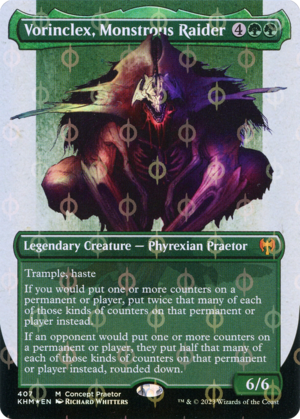
Card Details
Info
| Color: | |
| Identifies: | |
| Cost: |
|
| Rarity: | Mythic |
| Converted Cost: | 6 |
| Power/Toughness: | 6/6 |
| Types: | |
| SubTypes: | |
| Languages: | 
          |
| Layout: | Normal |
| Rank: | |
| Saltiness: |
Abilities/Keywords
Rules
Prices
| Seller | Price |
|---|---|
| Cardkingdom | 119.99 USD |
| Tcgplayer | 84.87 USD |
| Manapool | 76.71 USD |
| Cardmarket | 55.76 EUR |
Legalities
Standardbrawl
Vintage
Timeless
Duel
Future
Pauper
Pioneer
Legacy
Gladiator
Brawl
Predh
Paupercommander
Modern
Standard
Commander
Oathbreaker
Oldschool
Historic
Alchemy
Penny
Premodern
Text
Trample, haste If you would put one or more counters on a permanent or player, put twice that many of each of those kinds of counters on that permanent or player instead. If an opponent would put one or more counters on a permanent or player, they put half that many of each of those kinds of counters on that permanent or player instead, rounded down.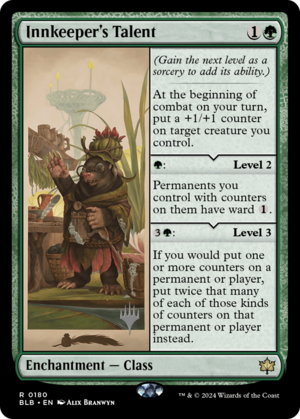
Card Details
Info
| Color: | |
| Identifies: | |
| Cost: |
|
| Rarity: | Rare |
| Converted Cost: | 2 |
| Power/Toughness: | / |
| Types: | |
| SubTypes: | |
| Languages: | 
     |
| Layout: | Class |
| Rank: | |
| Saltiness: |
Rules
Prices
Legalities
Standardbrawl
Vintage
Timeless
Duel
Future
Pauper
Pioneer
Legacy
Gladiator
Brawl
Predh
Paupercommander
Modern
Standard
Commander
Oathbreaker
Oldschool
Historic
Alchemy
Penny
Premodern
Text
(Gain the next level as a sorcery to add its ability.) At the beginning of combat on your turn, put a +1/+1counteron target creature you control.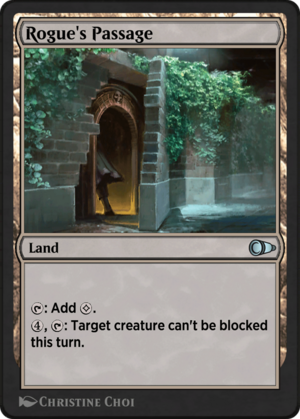
Card Details
Info
| Color: | |
| Identifies: | |
| Cost: | |
| Rarity: | Uncommon |
| Converted Cost: | 0 |
| Power/Toughness: | / |
| Types: | |
| SubTypes: | |
| Languages: | 
          |
| Layout: | Normal |
| Rank: | |
| Saltiness: |
Rules
Prices
| Seller | Price |
|---|
Legalities
Standardbrawl
Vintage
Timeless
Duel
Future
Pauper
Pioneer
Legacy
Gladiator
Brawl
Predh
Paupercommander
Modern
Standard
Commander
Oathbreaker
Oldschool
Historic
Alchemy
Penny
Premodern
Text
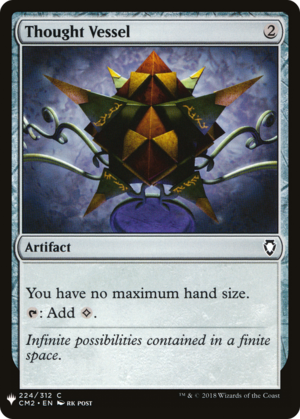
Card Details
Info
| Color: | |
| Identifies: | |
| Cost: |
|
| Rarity: | Common |
| Converted Cost: | 2 |
| Power/Toughness: | / |
| Types: | |
| SubTypes: | |
| Languages: | 
         |
| Layout: | Normal |
| Rank: | |
| Saltiness: |
Rules
Text
You have no maximum hand size.
Card Details
Info
| Color: | |
| Identifies: | |
| Cost: |
|
| Rarity: | Uncommon |
| Converted Cost: | 3 |
| Power/Toughness: | 2/1 |
| Types: | |
| SubTypes: | |
| Languages: | 
         |
| Layout: | Normal |
| Rank: | |
| Saltiness: |
Rules
Prices
Legalities
Standardbrawl
Vintage
Timeless
Duel
Future
Pauper
Pioneer
Legacy
Gladiator
Brawl
Predh
Paupercommander
Modern
Standard
Commander
Oathbreaker
Oldschool
Historic
Alchemy
Penny
Premodern
Text
When this creature enters, you may return target card from your graveyard to your hand.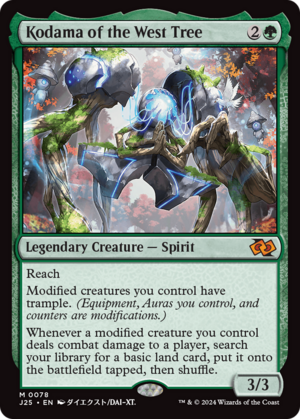
Card Details
Info
| Color: | |
| Identifies: | |
| Cost: |
|
| Rarity: | Mythic |
| Converted Cost: | 3 |
| Power/Toughness: | 3/3 |
| Types: | |
| SubTypes: | |
| Languages: | 
          |
| Layout: | Normal |
| Rank: | |
| Saltiness: |
Abilities/Keywords
Rules
Text
Reach Modified creatures you control have trample. (Equipment, Auras you control, and counters are modifications.) Whenever a modified creature you control deals combat damage to a player, search your library for a basic land card, put it onto the battlefield tapped, thenshuffle
Card Details
Info
| Color: | |
| Identifies: | |
| Cost: |
|
| Rarity: | Common |
| Converted Cost: | 2 |
| Power/Toughness: | / |
| Types: | |
| SubTypes: | |
| Languages: | 
          |
| Layout: | Normal |
| Rank: | |
| Saltiness: |
Rules
Text
Search your library for a Plains, Island, Swamp, or Mountain card, put it onto the battlefield tapped, thenshuffle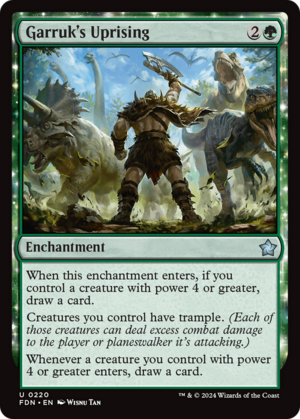
Card Details
Info
| Color: | |
| Identifies: | |
| Cost: |
|
| Rarity: | Uncommon |
| Converted Cost: | 3 |
| Power/Toughness: | / |
| Types: | |
| SubTypes: | |
| Languages: | 
          |
| Layout: | Normal |
| Rank: | |
| Saltiness: |
Rules
Prices
Legalities
Standardbrawl
Vintage
Timeless
Duel
Future
Pauper
Pioneer
Legacy
Gladiator
Brawl
Predh
Paupercommander
Modern
Standard
Commander
Oathbreaker
Oldschool
Historic
Alchemy
Penny
Premodern
Text
When this enchantment enters, if you control a creature with power 4 or greater, draw a card. Creatures you control have trample. (Each of those creatures can deal excess combat damage to the player or planeswalker it's attacking.) Whenever a creature you control with power 4 or greater enters, draw a card.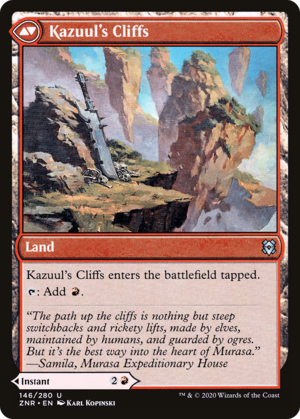
Card Details
- Card Faces:
- Kazuul's Fury (Front)
- Kazuul's Cliffs (Back)
Info
| Color: | |
| Identifies: | |
| Cost: |
|
| Rarity: | Uncommon |
| Converted Cost: | 3 |
| Power/Toughness: | / |
| Types: | |
| SubTypes: | |
| Languages: | 
          |
| Layout: | Modal Dfc |
| Rank: | |
| Saltiness: |
Rules
Prices
Legalities
Standardbrawl
Vintage
Timeless
Duel
Future
Pauper
Pioneer
Legacy
Gladiator
Brawl
Predh
Paupercommander
Modern
Standard
Commander
Oathbreaker
Oldschool
Historic
Alchemy
Penny
Premodern
Text
As an additional cost to cast this spell,sacrificea creature. Kazuul's Fury deals damage equal to the sacrificed creature's power to any target.Info
| Color: | |
| Identifies: | |
| Cost: | |
| Rarity: | Uncommon |
| Converted Cost: | 0 |
| Power/Toughness: | / |
| Types: | |
| SubTypes: | |
| Languages: | 
          |
| Layout: | Modal Dfc |
| Rank: | |
| Saltiness: |
Rules
Text
This land enters tapped.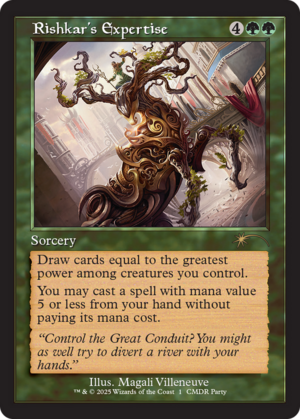
Card Details
Info
| Color: | |
| Identifies: | |
| Cost: |
|
| Rarity: | Rare |
| Converted Cost: | 6 |
| Power/Toughness: | / |
| Types: | |
| SubTypes: | |
| Languages: | 
          |
| Layout: | Normal |
| Rank: | |
| Saltiness: |
Rules
Prices
Legalities
Standardbrawl
Vintage
Timeless
Duel
Future
Pauper
Pioneer
Legacy
Gladiator
Brawl
Predh
Paupercommander
Modern
Standard
Commander
Oathbreaker
Oldschool
Historic
Alchemy
Penny
Premodern
Text
Draw cards equal to the greatest power among creatures you control. You may cast a spell with mana value 5 or less from your hand without paying its mana cost.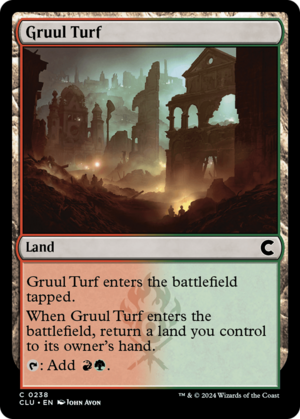
Card Details
Info
| Color: | |
| Identifies: | |
| Cost: | |
| Rarity: | Common |
| Converted Cost: | 0 |
| Power/Toughness: | / |
| Types: | |
| SubTypes: | |
| Languages: | 
         |
| Layout: | Normal |
| Rank: | |
| Saltiness: |
Rules
Text
This land enters tapped. When this land enters, return a land you control to its owner's hand.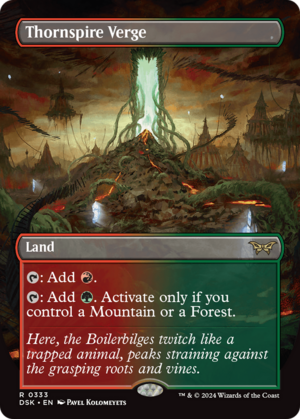
Card Details
Info
| Color: | |
| Identifies: | |
| Cost: | |
| Rarity: | Rare |
| Converted Cost: | 0 |
| Power/Toughness: | / |
| Types: | |
| SubTypes: | |
| Languages: | 
     |
| Layout: | Normal |
| Rank: | |
| Saltiness: |
Rules
Prices
Legalities
Standardbrawl
Vintage
Timeless
Duel
Future
Pauper
Pioneer
Legacy
Gladiator
Brawl
Predh
Paupercommander
Modern
Standard
Commander
Oathbreaker
Oldschool
Historic
Alchemy
Penny
Premodern
Text
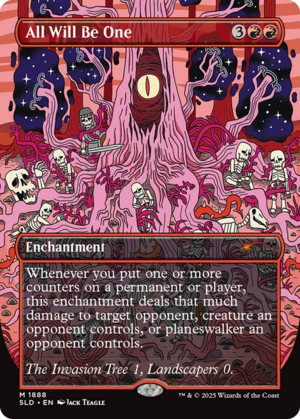
Card Details
Info
| Color: | |
| Identifies: | |
| Cost: |
|
| Rarity: | Mythic |
| Converted Cost: | 5 |
| Power/Toughness: | / |
| Types: | |
| SubTypes: | |
| Languages: | 
|
| Layout: | Normal |
| Rank: | |
| Saltiness: |
Rules
Text
Whenever you put one or more counters on a permanent or player, this enchantment deals that much damage to target opponent, creature an opponent controls, or planeswalker an opponent controls.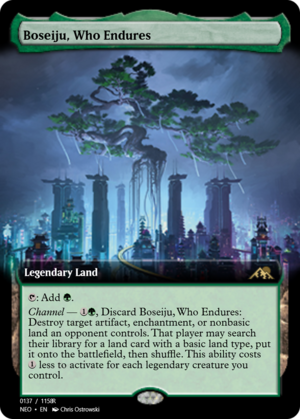
Card Details
Info
| Color: | |
| Identifies: | |
| Cost: | |
| Rarity: | Rare |
| Converted Cost: | 0 |
| Power/Toughness: | / |
| Types: | |
| SubTypes: | |
| Languages: | 
          |
| Layout: | Normal |
| Rank: | |
| Saltiness: |
Abilities/Keywords
Rules
Prices
| Seller | Price |
|---|
Legalities
Standardbrawl
Vintage
Timeless
Duel
Future
Pauper
Pioneer
Legacy
Gladiator
Brawl
Predh
Paupercommander
Modern
Standard
Commander
Oathbreaker
Oldschool
Historic
Alchemy
Penny
Premodern
Text
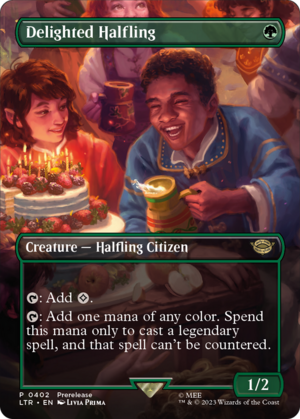
Card Details
Info
| Color: | |
| Identifies: | |
| Cost: |
|
| Rarity: | Rare |
| Converted Cost: | 1 |
| Power/Toughness: | 1/2 |
| Types: | |
| SubTypes: | |
| Languages: | 
       |
| Layout: | Normal |
| Rank: | |
| Saltiness: |
Rules
Prices
Legalities
Standardbrawl
Vintage
Timeless
Duel
Future
Pauper
Pioneer
Legacy
Gladiator
Brawl
Predh
Paupercommander
Modern
Standard
Commander
Oathbreaker
Oldschool
Historic
Alchemy
Penny
Premodern
Text
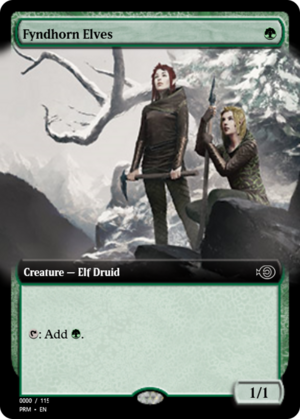
Card Details
Info
| Color: | |
| Identifies: | |
| Cost: |
|
| Rarity: | Common |
| Converted Cost: | 1 |
| Power/Toughness: | 1/1 |
| Types: | |
| SubTypes: | |
| Languages: | 
      |
| Layout: | Normal |
| Rank: | |
| Saltiness: |
Rules
Prices
| Seller | Price |
|---|
Legalities
Standardbrawl
Vintage
Timeless
Duel
Future
Pauper
Pioneer
Legacy
Gladiator
Brawl
Predh
Paupercommander
Modern
Standard
Commander
Oathbreaker
Oldschool
Historic
Alchemy
Penny
Premodern
Text
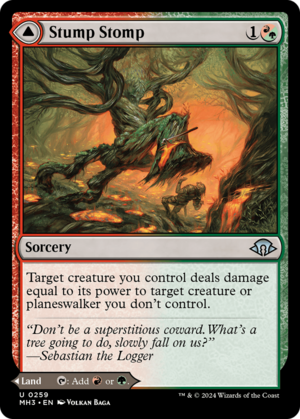
Card Details
- Card Faces:
- Stump Stomp (Front)
- Burnwillow Clearing (Back)
Info
| Color: | |
| Identifies: | |
| Cost: |
|
| Rarity: | Uncommon |
| Converted Cost: | 2 |
| Power/Toughness: | / |
| Types: | |
| SubTypes: | |
| Languages: | 
       |
| Layout: | Modal Dfc |
| Rank: | |
| Saltiness: |
Rules
Prices
Legalities
Standardbrawl
Vintage
Timeless
Duel
Future
Pauper
Pioneer
Legacy
Gladiator
Brawl
Predh
Paupercommander
Modern
Standard
Commander
Oathbreaker
Oldschool
Historic
Alchemy
Penny
Premodern
Text
Target creature you control deals damage equal to its power to target creature or planeswalker you don't control.Info
| Color: | |
| Identifies: | |
| Cost: | |
| Rarity: | Uncommon |
| Converted Cost: | 0 |
| Power/Toughness: | / |
| Types: | |
| SubTypes: | |
| Languages: | 
       |
| Layout: | Modal Dfc |
| Rank: | |
| Saltiness: |
Rules
Text
This land enters tapped.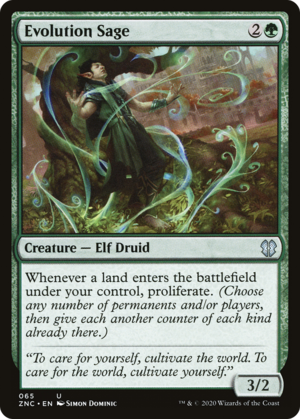
Card Details
Info
| Color: | |
| Identifies: | |
| Cost: |
|
| Rarity: | Uncommon |
| Converted Cost: | 3 |
| Power/Toughness: | 3/2 |
| Types: | |
| SubTypes: | |
| Languages: | 
          |
| Layout: | Normal |
| Rank: | |
| Saltiness: |
Abilities/Keywords
Rules
Text
Landfall — Whenever a land you control enters, proliferate. (Choose any number of permanents and/or players, then give each anothercounterof each kind already there.)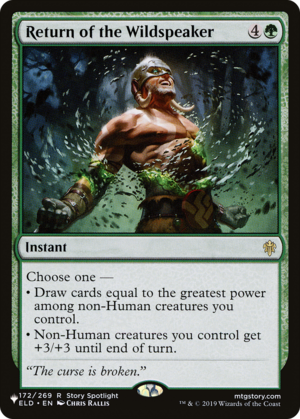
Card Details
Info
| Color: | |
| Identifies: | |
| Cost: |
|
| Rarity: | Rare |
| Converted Cost: | 5 |
| Power/Toughness: | / |
| Types: | |
| SubTypes: | |
| Languages: | 
         |
| Layout: | Normal |
| Rank: | |
| Saltiness: |
Rules
Text
Choose one — • Draw cards equal to the greatest power among non-Human creatures you control. • Non-Human creatures you control get +3/+3 until end of turn.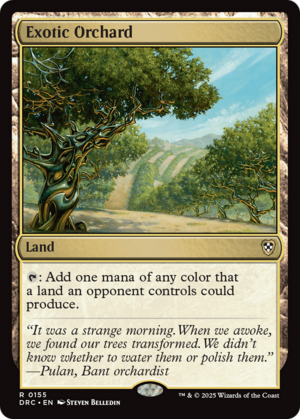
Card Details
Info
| Color: | |
| Identifies: | |
| Cost: | |
| Rarity: | Rare |
| Converted Cost: | 0 |
| Power/Toughness: | / |
| Types: | |
| SubTypes: | |
| Languages: | 
         |
| Layout: | Normal |
| Rank: | |
| Saltiness: |
Rules
Text
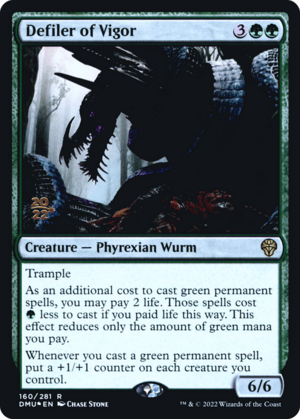
Card Details
Info
| Color: | |
| Identifies: | |
| Cost: |
|
| Rarity: | Rare |
| Converted Cost: | 5 |
| Power/Toughness: | 6/6 |
| Types: | |
| SubTypes: | |
| Languages: | 
       |
| Layout: | Normal |
| Rank: | |
| Saltiness: |
Abilities/Keywords
Rules
Text
Trample As an additional cost to cast green permanent spells, you may pay 2 life. Those spells cost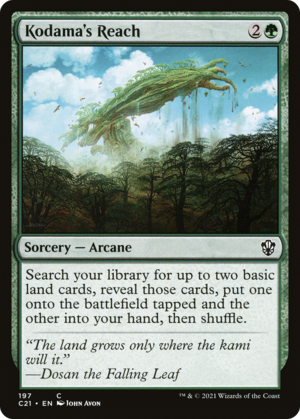
Card Details
Info
| Color: | |
| Identifies: | |
| Cost: |
|
| Rarity: | Common |
| Converted Cost: | 3 |
| Power/Toughness: | / |
| Types: | |
| SubTypes: | |
| Languages: | 
         |
| Layout: | Normal |
| Rank: | |
| Saltiness: |
Rules
Prices
Legalities
Standardbrawl
Vintage
Timeless
Duel
Future
Pauper
Pioneer
Legacy
Gladiator
Brawl
Predh
Paupercommander
Modern
Standard
Commander
Oathbreaker
Oldschool
Historic
Alchemy
Penny
Premodern
Text
Search your library for up to two basic land cards, reveal those cards, put one onto the battlefield tapped and the other into your hand, thenshuffle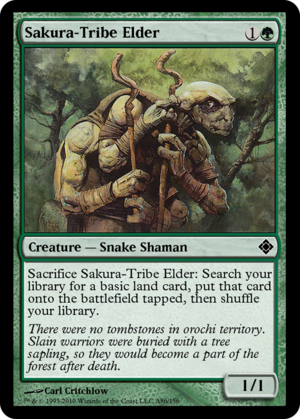
Card Details
Info
| Color: | |
| Identifies: | |
| Cost: |
|
| Rarity: | Common |
| Converted Cost: | 2 |
| Power/Toughness: | 1/1 |
| Types: | |
| SubTypes: | |
| Languages: | 
         |
| Layout: | Normal |
| Rank: | |
| Saltiness: |
Rules
Prices
| Seller | Price |
|---|
Legalities
Standardbrawl
Vintage
Timeless
Duel
Future
Pauper
Pioneer
Legacy
Gladiator
Brawl
Predh
Paupercommander
Modern
Standard
Commander
Oathbreaker
Oldschool
Historic
Alchemy
Penny
Premodern
Text
Sacrifice this creature: Search your library for a basic land card, put that card onto the battlefield tapped, thenshuffle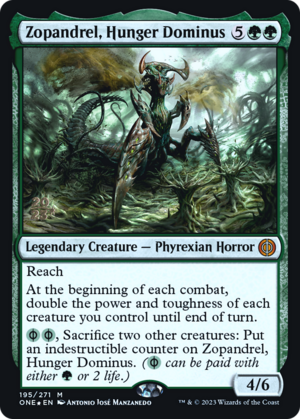
Card Details
Info
| Color: | |
| Identifies: | |
| Cost: |
|
| Rarity: | Mythic |
| Converted Cost: | 7 |
| Power/Toughness: | 4/6 |
| Types: | |
| SubTypes: | |
| Languages: | 
       |
| Layout: | Normal |
| Rank: | |
| Saltiness: |
Abilities/Keywords
Rules
Text
Reach At the beginning of each combat, double the power and toughness of each creature you control until end of turn.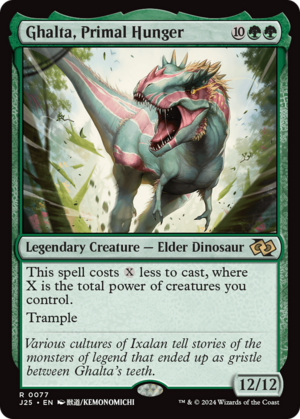
Card Details
Info
| Color: | |
| Identifies: | |
| Cost: |
|
| Rarity: | Rare |
| Converted Cost: | 12 |
| Power/Toughness: | 12/12 |
| Types: | |
| SubTypes: | |
| Languages: | 
          |
| Layout: | Normal |
| Rank: | |
| Saltiness: |
Abilities/Keywords
Rules
Text
This spell costs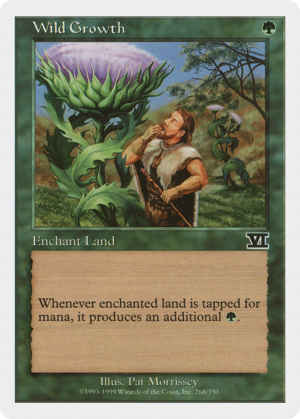
Card Details
Info
| Color: | |
| Identifies: | |
| Cost: |
|
| Rarity: | Common |
| Converted Cost: | 1 |
| Power/Toughness: | / |
| Types: | |
| SubTypes: | |
| Languages: | 
         |
| Layout: | Normal |
| Rank: | |
| Saltiness: |
Abilities/Keywords
Rules
Text
Enchant land Whenever enchanted land is tapped for mana, its controller adds an additional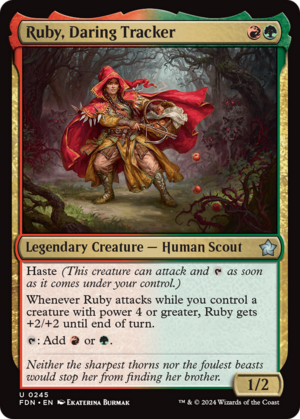
Card Details
Info
| Color: | |
| Identifies: | |
| Cost: |
|
| Rarity: | Uncommon |
| Converted Cost: | 2 |
| Power/Toughness: | 1/2 |
| Types: | |
| SubTypes: | |
| Languages: | 
       |
| Layout: | Normal |
| Rank: | |
| Saltiness: |
Abilities/Keywords
Rules
Prices
Legalities
Standardbrawl
Vintage
Timeless
Duel
Future
Pauper
Pioneer
Legacy
Gladiator
Brawl
Predh
Paupercommander
Modern
Standard
Commander
Oathbreaker
Oldschool
Historic
Alchemy
Penny
Premodern
Text
Haste (This creature can attack and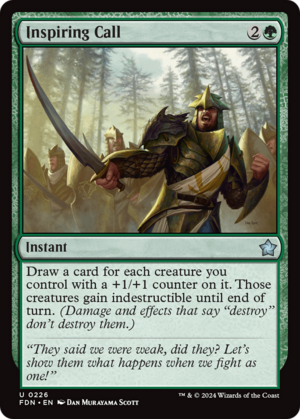
Card Details
Info
| Color: | |
| Identifies: | |
| Cost: |
|
| Rarity: | Uncommon |
| Converted Cost: | 3 |
| Power/Toughness: | / |
| Types: | |
| SubTypes: | |
| Languages: | 
          |
| Layout: | Normal |
| Rank: | |
| Saltiness: |
Rules
Prices
Legalities
Standardbrawl
Vintage
Timeless
Duel
Future
Pauper
Pioneer
Legacy
Gladiator
Brawl
Predh
Paupercommander
Modern
Standard
Commander
Oathbreaker
Oldschool
Historic
Alchemy
Penny
Premodern
Text
Draw a card for each creature you control with a +1/+1counteron it. Those creatures gain indestructible until end of turn. (Damage and effects that say "destroy" don'tdestroythem.)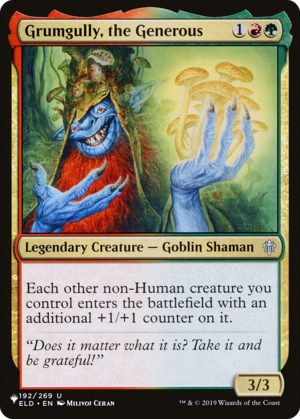
Card Details
Info
| Color: | |
| Identifies: | |
| Cost: |
|
| Rarity: | Uncommon |
| Converted Cost: | 3 |
| Power/Toughness: | 3/3 |
| Types: | |
| SubTypes: | |
| Languages: | 
          |
| Layout: | Normal |
| Rank: | |
| Saltiness: |
Rules
Text
Each other non-Human creature you control enters with an additional +1/+1counteron it.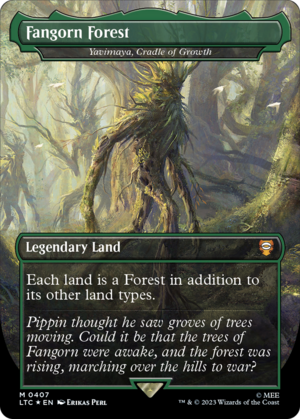
Card Details
Info
| Color: | |
| Identifies: | |
| Cost: | |
| Rarity: | Mythic |
| Converted Cost: | 0 |
| Power/Toughness: | / |
| Types: | |
| SubTypes: | |
| Languages: | 
          |
| Layout: | Normal |
| Rank: | |
| Saltiness: |
Rules
Prices
| Seller | Price |
|---|---|
| Manapool | 109.68 USD |
| Tcgplayer | 116.95 USD |
| Cardmarket | 108.92 EUR |
Legalities
Standardbrawl
Vintage
Timeless
Duel
Future
Pauper
Pioneer
Legacy
Gladiator
Brawl
Predh
Paupercommander
Modern
Standard
Commander
Oathbreaker
Oldschool
Historic
Alchemy
Penny
Premodern
Text
Each land is a Forest in addition to its other land types.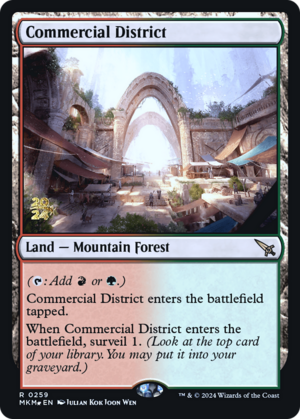
Card Details
Info
| Color: | |
| Identifies: | |
| Cost: | |
| Rarity: | Rare |
| Converted Cost: | 0 |
| Power/Toughness: | / |
| Types: | |
| SubTypes: | |
| Languages: | 
       |
| Layout: | Normal |
| Rank: | |
| Saltiness: |
Abilities/Keywords
Rules
Prices
| Seller | Price |
|---|---|
| Tcgplayer | 10.41 USD |
Legalities
Standardbrawl
Vintage
Timeless
Duel
Future
Pauper
Pioneer
Legacy
Gladiator
Brawl
Predh
Paupercommander
Modern
Standard
Commander
Oathbreaker
Oldschool
Historic
Alchemy
Penny
Premodern
Text
(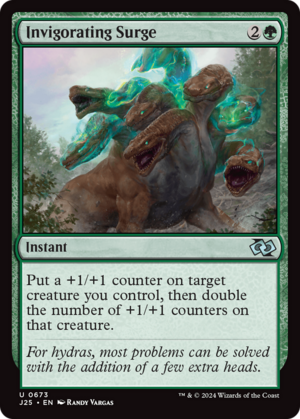
Card Details
Info
| Color: | |
| Identifies: | |
| Cost: |
|
| Rarity: | Uncommon |
| Converted Cost: | 3 |
| Power/Toughness: | / |
| Types: | |
| SubTypes: | |
| Languages: | 
          |
| Layout: | Normal |
| Rank: | |
| Saltiness: |
Rules
Text
Put a +1/+1counteron target creature you control, then double the number of +1/+1 counters on that creature.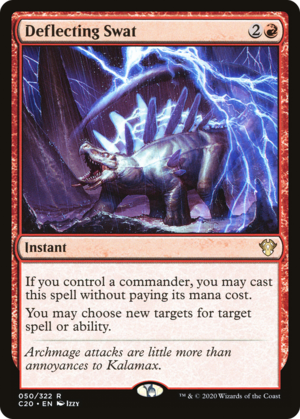
Card Details
Info
| Color: | |
| Identifies: | |
| Cost: |
|
| Rarity: | Rare |
| Converted Cost: | 3 |
| Power/Toughness: | / |
| Types: | |
| SubTypes: | |
| Languages: | 
        |
| Layout: | Normal |
| Rank: | |
| Saltiness: |
Rules
Prices
Legalities
Standardbrawl
Vintage
Timeless
Duel
Future
Pauper
Pioneer
Legacy
Gladiator
Brawl
Predh
Paupercommander
Modern
Standard
Commander
Oathbreaker
Oldschool
Historic
Alchemy
Penny
Premodern
Text
If you control a commander, you may cast this spell without paying its mana cost. You may choose new targets for target spell or ability.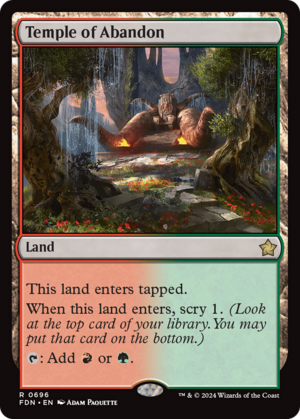
Card Details
Info
| Color: | |
| Identifies: | |
| Cost: | |
| Rarity: | Rare |
| Converted Cost: | 0 |
| Power/Toughness: | / |
| Types: | |
| SubTypes: | |
| Languages: | 
          |
| Layout: | Normal |
| Rank: | |
| Saltiness: |
Abilities/Keywords
Rules
Text
This land enters tapped. When this land enters, scry 1. (Look at the top card of your library. You may put that card on the bottom.)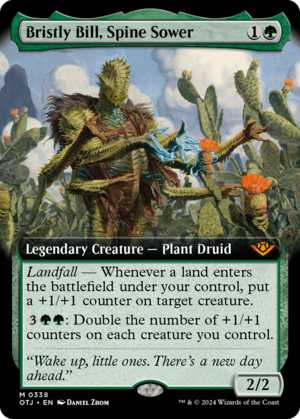
Card Details
Info
| Color: | |
| Identifies: | |
| Cost: |
|
| Rarity: | Mythic |
| Converted Cost: | 2 |
| Power/Toughness: | 2/2 |
| Types: | |
| SubTypes: | |
| Languages: | 
       |
| Layout: | Normal |
| Rank: | |
| Saltiness: |
Abilities/Keywords
Rules
Prices
Legalities
Standardbrawl
Vintage
Timeless
Duel
Future
Pauper
Pioneer
Legacy
Gladiator
Brawl
Predh
Paupercommander
Modern
Standard
Commander
Oathbreaker
Oldschool
Historic
Alchemy
Penny
Premodern
Text
Landfall — Whenever a land you control enters, put a +1/+1counteron target creature.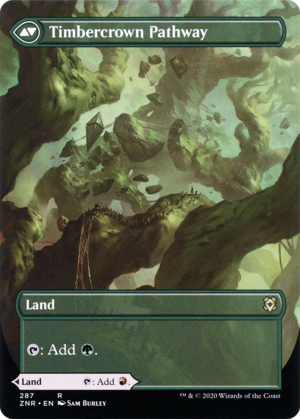
Card Details
- Card Faces:
- Cragcrown Pathway (Front)
- Timbercrown Pathway (Back)
Info
| Color: | |
| Identifies: | |
| Cost: | |
| Rarity: | Rare |
| Converted Cost: | 0 |
| Power/Toughness: | / |
| Types: | |
| SubTypes: | |
| Languages: | 
          |
| Layout: | Modal Dfc |
| Rank: | |
| Saltiness: |
Rules
Prices
Legalities
Standardbrawl
Vintage
Timeless
Duel
Future
Pauper
Pioneer
Legacy
Gladiator
Brawl
Predh
Paupercommander
Modern
Standard
Commander
Oathbreaker
Oldschool
Historic
Alchemy
Penny
Premodern
Text
Info
| Color: | |
| Identifies: | |
| Cost: | |
| Rarity: | Rare |
| Converted Cost: | 0 |
| Power/Toughness: | / |
| Types: | |
| SubTypes: | |
| Languages: | 
          |
| Layout: | Modal Dfc |
| Rank: | |
| Saltiness: |
Rules
Text
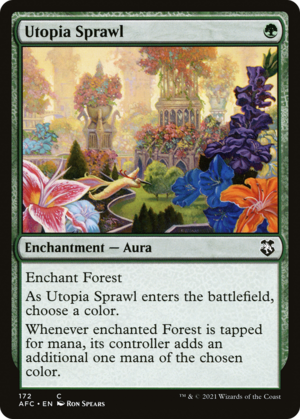
Card Details
Info
| Color: | |
| Identifies: | |
| Cost: |
|
| Rarity: | Common |
| Converted Cost: | 1 |
| Power/Toughness: | / |
| Types: | |
| SubTypes: | |
| Languages: | 
         |
| Layout: | Normal |
| Rank: | |
| Saltiness: |
Abilities/Keywords
Rules
Text
Enchant Forest As this Aura enters, choose a color. Whenever enchanted Forest is tapped for mana, its controller adds an additional one mana of the chosen color.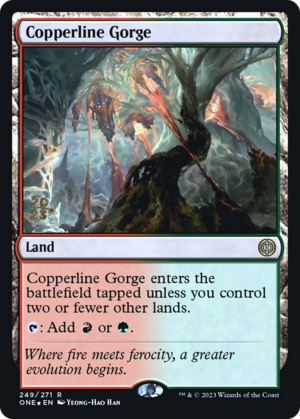
Card Details
Info
| Color: | |
| Identifies: | |
| Cost: | |
| Rarity: | Rare |
| Converted Cost: | 0 |
| Power/Toughness: | / |
| Types: | |
| SubTypes: | |
| Languages: | 
          |
| Layout: | Normal |
| Rank: | |
| Saltiness: |
Rules
Text
This land enters tapped unless you control two or fewer other lands.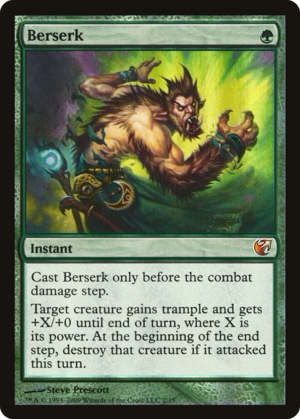
Card Details
Info
| Color: | |
| Identifies: | |
| Cost: |
|
| Rarity: | Mythic |
| Converted Cost: | 1 |
| Power/Toughness: | / |
| Types: | |
| SubTypes: | |
| Languages: | 
  |
| Layout: | Normal |
| Rank: | |
| Saltiness: |
Rules
Text
Cast this spell only before the combat damage step. Target creature gains trample and gets +X/+0 until end of turn, where X is its power. At the beginning of the next end step,destroythat creature if it attacked this turn.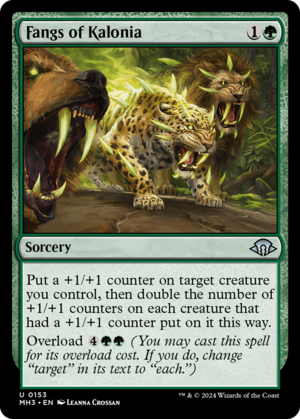
Card Details
Info
| Color: | |
| Identifies: | |
| Cost: |
|
| Rarity: | Uncommon |
| Converted Cost: | 2 |
| Power/Toughness: | / |
| Types: | |
| SubTypes: | |
| Languages: | 
       |
| Layout: | Normal |
| Rank: | |
| Saltiness: |
Abilities/Keywords
Rules
Prices
Legalities
Standardbrawl
Vintage
Timeless
Duel
Future
Pauper
Pioneer
Legacy
Gladiator
Brawl
Predh
Paupercommander
Modern
Standard
Commander
Oathbreaker
Oldschool
Historic
Alchemy
Penny
Premodern
Text
Put a +1/+1counteron target creature you control, then double the number of +1/+1 counters on each creature that had a +1/+1counterput on it this way. Overload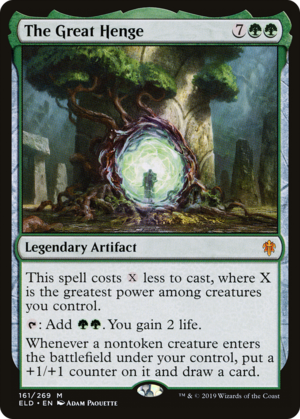
Card Details
Info
| Color: | |
| Identifies: | |
| Cost: |
|
| Rarity: | Mythic |
| Converted Cost: | 9 |
| Power/Toughness: | / |
| Types: | |
| SubTypes: | |
| Languages: | 
          |
| Layout: | Normal |
| Rank: | |
| Saltiness: |
Rules
Prices
Legalities
Standardbrawl
Vintage
Timeless
Duel
Future
Pauper
Pioneer
Legacy
Gladiator
Brawl
Predh
Paupercommander
Modern
Standard
Commander
Oathbreaker
Oldschool
Historic
Alchemy
Penny
Premodern
Text
This spell costs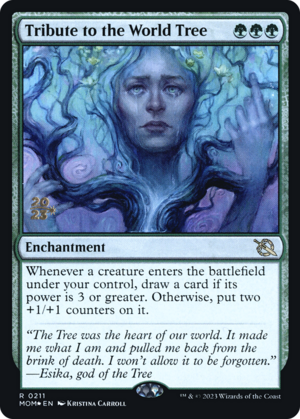
Card Details
Info
| Color: | |
| Identifies: | |
| Cost: |
|
| Rarity: | Rare |
| Converted Cost: | 3 |
| Power/Toughness: | / |
| Types: | |
| SubTypes: | |
| Languages: | 
    |
| Layout: | Normal |
| Rank: | |
| Saltiness: |
Rules
Text
Whenever a creature you control enters, draw a card if its power is 3 or greater. Otherwise, put two +1/+1 counters on it.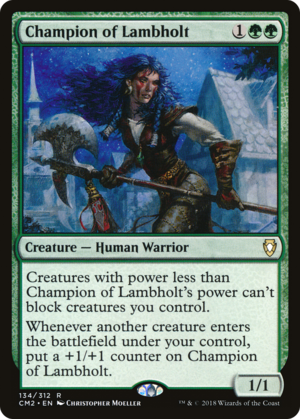
Card Details
Info
| Color: | |
| Identifies: | |
| Cost: |
|
| Rarity: | Rare |
| Converted Cost: | 3 |
| Power/Toughness: | 1/1 |
| Types: | |
| SubTypes: | |
| Languages: | 
          |
| Layout: | Normal |
| Rank: | |
| Saltiness: |
Rules
Text
Creatures with power less than this creature's power can't block creatures you control. Whenever another creature you control enters, put a +1/+1counteron this creature.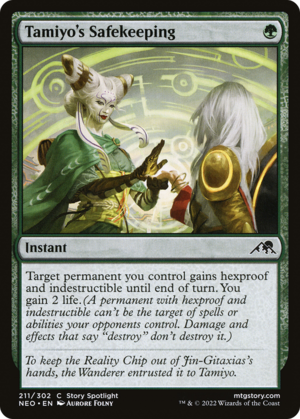
Card Details
Info
| Color: | |
| Identifies: | |
| Cost: |
|
| Rarity: | Common |
| Converted Cost: | 1 |
| Power/Toughness: | / |
| Types: | |
| SubTypes: | |
| Languages: | 
          |
| Layout: | Normal |
| Rank: | |
| Saltiness: |
Rules
Prices
Legalities
Standardbrawl
Vintage
Timeless
Duel
Future
Pauper
Pioneer
Legacy
Gladiator
Brawl
Predh
Paupercommander
Modern
Standard
Commander
Oathbreaker
Oldschool
Historic
Alchemy
Penny
Premodern
Text
Target permanent you control gains hexproof and indestructible until end of turn. You gain 2 life. (A permanent with hexproof and indestructible can't be the target of spells or abilities your opponents control. Damage and effects that say "destroy" don'tdestroyit.)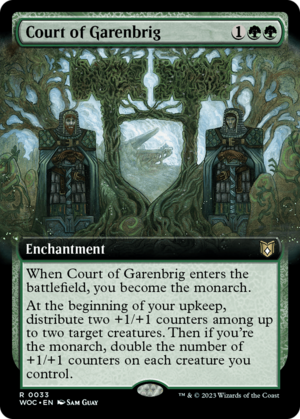
Card Details
Info
| Color: | |
| Identifies: | |
| Cost: |
|
| Rarity: | Rare |
| Converted Cost: | 3 |
| Power/Toughness: | / |
| Types: | |
| SubTypes: | |
| Languages: | 
     |
| Layout: | Normal |
| Rank: | |
| Saltiness: | |
| Tokens: |
Rules
Prices
Legalities
Standardbrawl
Vintage
Timeless
Duel
Future
Pauper
Pioneer
Legacy
Gladiator
Brawl
Predh
Paupercommander
Modern
Standard
Commander
Oathbreaker
Oldschool
Historic
Alchemy
Penny
Premodern
Text
When this enchantment enters, you become the monarch. At the beginning of your upkeep, distribute two +1/+1 counters among up to two target creatures. Then if you're the monarch, double the number of +1/+1 counters on each creature you control.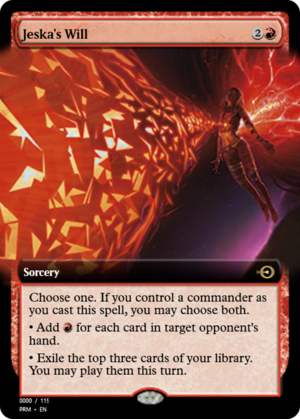
Card Details
Info
| Color: | |
| Identifies: | |
| Cost: |
|
| Rarity: | Rare |
| Converted Cost: | 3 |
| Power/Toughness: | / |
| Types: | |
| SubTypes: | |
| Languages: | 
         |
| EDH Bracket Attr: | Game Changer |
| Layout: | Normal |
| Rank: | |
| Saltiness: |
Rules
Prices
| Seller | Price |
|---|
Legalities
Standardbrawl
Vintage
Timeless
Duel
Future
Pauper
Pioneer
Legacy
Gladiator
Brawl
Predh
Paupercommander
Modern
Standard
Commander
Oathbreaker
Oldschool
Historic
Alchemy
Penny
Premodern
Text
Choose one. If you control a commander as you cast this spell, you may choose both instead. • Add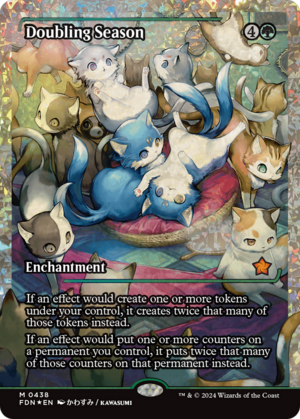
Card Details
Info
| Color: | |
| Identifies: | |
| Cost: |
|
| Rarity: | Mythic |
| Converted Cost: | 5 |
| Power/Toughness: | / |
| Types: | |
| SubTypes: | |
| Languages: | 
        |
| Layout: | Normal |
| Rank: | |
| Saltiness: |
Rules
Prices
| Seller | Price |
|---|---|
| Manapool | 624.98 USD |
| Cardmarket | 324.8 EUR |
| Tcgplayer | 558.11 USD |
Legalities
Standardbrawl
Vintage
Timeless
Duel
Future
Pauper
Pioneer
Legacy
Gladiator
Brawl
Predh
Paupercommander
Modern
Standard
Commander
Oathbreaker
Oldschool
Historic
Alchemy
Penny
Premodern
Text
If an effect would create one or more tokens under your control, it creates twice that many of those tokens instead. If an effect would put one or more counters on a permanent you control, it puts twice that many of those counters on that permanent instead.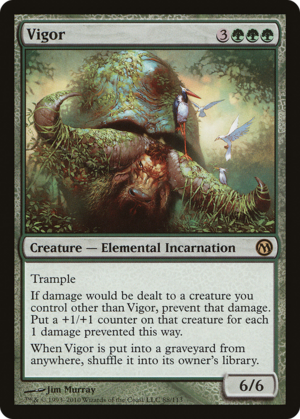
Card Details
Info
| Color: | |
| Identifies: | |
| Cost: |
|
| Rarity: | Rare |
| Converted Cost: | 6 |
| Power/Toughness: | 6/6 |
| Types: | |
| SubTypes: | |
| Languages: | 
        |
| Layout: | Normal |
| Rank: | |
| Saltiness: |
Abilities/Keywords
Rules
Text
Trample If damage would be dealt to another creature you control, prevent that damage. Put a +1/+1counteron that creature for each 1 damage prevented this way. When Vigor is put into a graveyard from anywhere,shuffleit into its owner's library.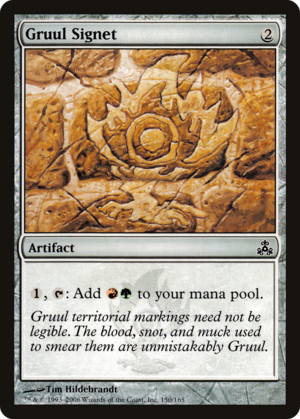
Card Details
Info
| Color: | |
| Identifies: | |
| Cost: |
|
| Rarity: | Common |
| Converted Cost: | 2 |
| Power/Toughness: | / |
| Types: | |
| SubTypes: | |
| Languages: | 
         |
| Layout: | Normal |
| Rank: | |
| Saltiness: |
Rules
Prices
Legalities
Standardbrawl
Vintage
Timeless
Duel
Future
Pauper
Pioneer
Legacy
Gladiator
Brawl
Predh
Paupercommander
Modern
Standard
Commander
Oathbreaker
Oldschool
Historic
Alchemy
Penny
Premodern
Text
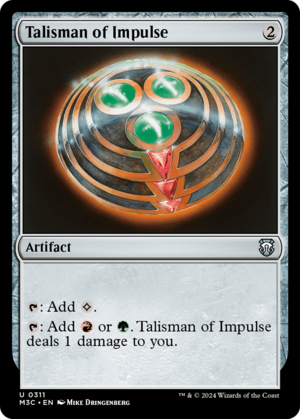
Card Details
Info
| Color: | |
| Identifies: | |
| Cost: |
|
| Rarity: | Uncommon |
| Converted Cost: | 2 |
| Power/Toughness: | / |
| Types: | |
| SubTypes: | |
| Languages: | 
      |
| Layout: | Normal |
| Rank: | |
| Saltiness: |
Rules
Prices
Legalities
Standardbrawl
Vintage
Timeless
Duel
Future
Pauper
Pioneer
Legacy
Gladiator
Brawl
Predh
Paupercommander
Modern
Standard
Commander
Oathbreaker
Oldschool
Historic
Alchemy
Penny
Premodern
Text
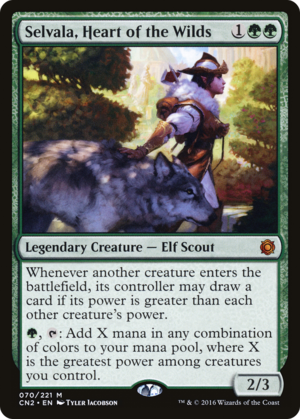
Card Details
Info
| Color: | |
| Identifies: | |
| Cost: |
|
| Rarity: | Mythic |
| Converted Cost: | 3 |
| Power/Toughness: | 2/3 |
| Types: | |
| SubTypes: | |
| Languages: | 
       |
| Layout: | Normal |
| Rank: | |
| Saltiness: |
Rules
Prices
Legalities
Standardbrawl
Vintage
Timeless
Duel
Future
Pauper
Pioneer
Legacy
Gladiator
Brawl
Predh
Paupercommander
Modern
Standard
Commander
Oathbreaker
Oldschool
Historic
Alchemy
Penny
Premodern
Text
Whenever another creature enters, its controller may draw a card if its power is greater than each other creature's power.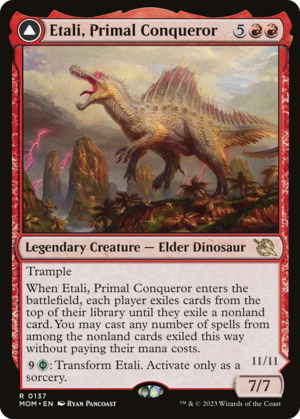
Card Details
Etali, Primal Conqueror (Etali, Primal Conqueror // Etali, Primal Sickness) #137 Legendary Creature — Elder Dinosaur
Info
| Color: | |
| Identifies: | |
| Cost: |
|
| Rarity: | Rare |
| Converted Cost: | 7 |
| Power/Toughness: | 7/7 |
| Types: | |
| SubTypes: | |
| Languages: | 
       |
| Layout: | Transform |
| Rank: | |
| Saltiness: | |
| Tokens: |
Abilities/Keywords
Rules
Text
Trample When Etali enters, each player exiles cards from the top of their library until they exile a nonland card. You may cast any number of spells from among the nonland cards exiled this way without paying their mana costs.Etali, Primal Sickness (Etali, Primal Conqueror // Etali, Primal Sickness) #137 Legendary Creature — Phyrexian Elder Dinosaur
Info
| Color: | |
| Identifies: | |
| Cost: | |
| Rarity: | Rare |
| Converted Cost: | 7 |
| Power/Toughness: | 11/11 |
| Types: | |
| SubTypes: | |
| Languages: | 
       |
| Layout: | Transform |
| Rank: | |
| Saltiness: | |
| Tokens: |
Abilities/Keywords
Rules
Prices
Legalities
Standardbrawl
Vintage
Timeless
Duel
Future
Pauper
Pioneer
Legacy
Gladiator
Brawl
Predh
Paupercommander
Modern
Standard
Commander
Oathbreaker
Oldschool
Historic
Alchemy
Penny
Premodern
Text
Trample, indestructible Whenever Etali deals combat damage to a player, they get that many poison counters. (A player with ten or more poison counters loses the game.)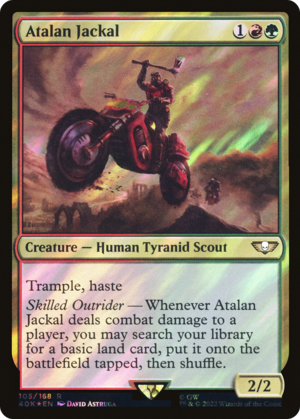
Card Details
Info
| Color: | |
| Identifies: | |
| Cost: |
|
| Rarity: | Rare |
| Converted Cost: | 3 |
| Power/Toughness: | 2/2 |
| Types: | |
| SubTypes: | |
| Languages: | 
       |
| Layout: | Normal |
| Rank: | |
| Saltiness: |
Abilities/Keywords
Rules
Text
Trample, haste Skilled Outrider — Whenever this creature deals combat damage to a player, you may search your library for a basic land card, put it onto the battlefield tapped, thenshuffle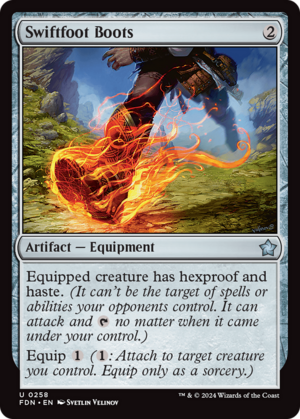
Card Details
Info
| Color: | |
| Identifies: | |
| Cost: |
|
| Rarity: | Uncommon |
| Converted Cost: | 2 |
| Power/Toughness: | / |
| Types: | |
| SubTypes: | |
| Languages: | 
          |
| Layout: | Normal |
| Rank: | |
| Saltiness: |
Abilities/Keywords
Rules
Prices
Legalities
Standardbrawl
Vintage
Timeless
Duel
Future
Pauper
Pioneer
Legacy
Gladiator
Brawl
Predh
Paupercommander
Modern
Standard
Commander
Oathbreaker
Oldschool
Historic
Alchemy
Penny
Premodern
Text
Equipped creature has hexproof and haste. (It can't be the target of spells or abilities your opponents control. It can attack and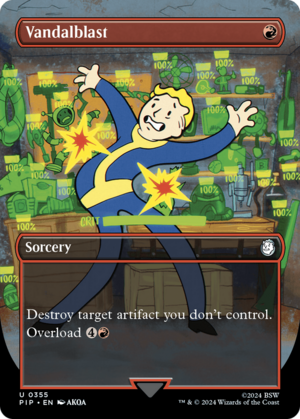
Card Details
Info
| Color: | |
| Identifies: | |
| Cost: |
|
| Rarity: | Uncommon |
| Converted Cost: | 1 |
| Power/Toughness: | / |
| Types: | |
| SubTypes: | |
| Languages: | 
          |
| Layout: | Normal |
| Rank: | |
| Saltiness: |
Abilities/Keywords
Rules
Prices
Legalities
Standardbrawl
Vintage
Timeless
Duel
Future
Pauper
Pioneer
Legacy
Gladiator
Brawl
Predh
Paupercommander
Modern
Standard
Commander
Oathbreaker
Oldschool
Historic
Alchemy
Penny
Premodern
Text
Destroy target artifact you don't control. Overload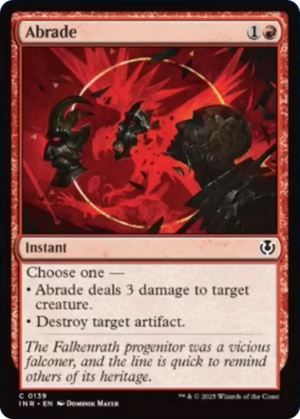
Card Details
Info
| Color: | |
| Identifies: | |
| Cost: |
|
| Rarity: | Common |
| Converted Cost: | 2 |
| Power/Toughness: | / |
| Types: | |
| SubTypes: | |
| Languages: | 
          |
| Layout: | Normal |
| Rank: | |
| Saltiness: |
Rules
Prices
Legalities
Standardbrawl
Vintage
Timeless
Duel
Future
Pauper
Pioneer
Legacy
Gladiator
Brawl
Predh
Paupercommander
Modern
Standard
Commander
Oathbreaker
Oldschool
Historic
Alchemy
Penny
Premodern
Text
Choose one — • Abrade deals 3 damage to target creature. •Destroytarget artifact.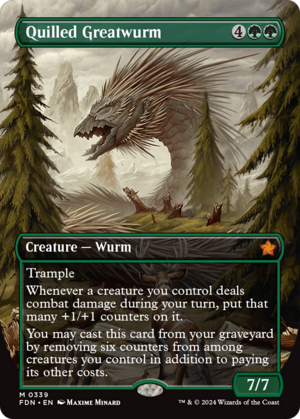
Card Details
Info
| Color: | |
| Identifies: | |
| Cost: |
|
| Rarity: | Mythic |
| Converted Cost: | 6 |
| Power/Toughness: | 7/7 |
| Types: | |
| SubTypes: | |
| Languages: | 
     |
| Layout: | Normal |
| Rank: | |
| Saltiness: |
Abilities/Keywords
Rules
Prices
Legalities
Standardbrawl
Vintage
Timeless
Duel
Future
Pauper
Pioneer
Legacy
Gladiator
Brawl
Predh
Paupercommander
Modern
Standard
Commander
Oathbreaker
Oldschool
Historic
Alchemy
Penny
Premodern
Text
Trample Whenever a creature you control deals combat damage during your turn, put that many +1/+1 counters on it. (It must survive to get the counters.) You may cast this card from your graveyard by removing six counters from among creatures you control in addition to paying its other costs.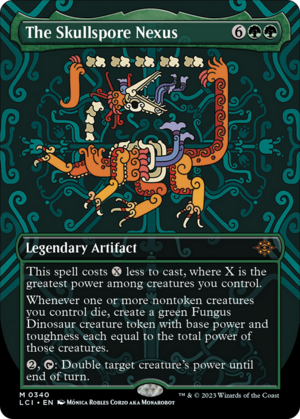
Card Details
Info
| Color: | |
| Identifies: | |
| Cost: |
|
| Rarity: | Mythic |
| Converted Cost: | 8 |
| Power/Toughness: | / |
| Types: | |
| SubTypes: | |
| Languages: | 
       |
| Layout: | Normal |
| Rank: | |
| Saltiness: | |
| Tokens: |
Rules
Prices
Legalities
Standardbrawl
Vintage
Timeless
Duel
Future
Pauper
Pioneer
Legacy
Gladiator
Brawl
Predh
Paupercommander
Modern
Standard
Commander
Oathbreaker
Oldschool
Historic
Alchemy
Penny
Premodern
Text
This spell costs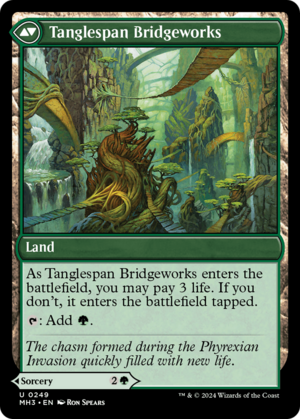
Card Details
Info
| Color: | |
| Identifies: | |
| Cost: |
|
| Rarity: | Uncommon |
| Converted Cost: | 3 |
| Power/Toughness: | / |
| Types: | |
| SubTypes: | |
| Languages: | 
       |
| Layout: | Modal Dfc |
| Rank: | |
| Saltiness: |
Abilities/Keywords
Rules
Prices
Legalities
Standardbrawl
Vintage
Timeless
Duel
Future
Pauper
Pioneer
Legacy
Gladiator
Brawl
Predh
Paupercommander
Modern
Standard
Commander
Oathbreaker
Oldschool
Historic
Alchemy
Penny
Premodern
Text
Target creature you control gets +2/+2 until end of turn. It fights up to one target creature you don't control. (Each deals damage equal to its power to the other.)Info
| Color: | |
| Identifies: | |
| Cost: | |
| Rarity: | Uncommon |
| Converted Cost: | 0 |
| Power/Toughness: | / |
| Types: | |
| SubTypes: | |
| Languages: | 
       |
| Layout: | Modal Dfc |
| Rank: | |
| Saltiness: |
Abilities/Keywords
Rules
Text
As this land enters, you may pay 3 life. If you don't, it enters tapped.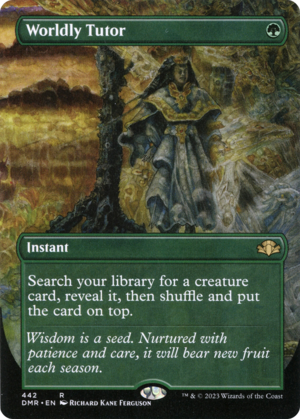
Card Details
Info
| Color: | |
| Identifies: | |
| Cost: |
|
| Rarity: | Rare |
| Converted Cost: | 1 |
| Power/Toughness: | / |
| Types: | |
| SubTypes: | |
| Languages: | 
       |
| EDH Bracket Attr: | Game Changer,tutors |
| Layout: | Normal |
| Rank: | |
| Saltiness: |
Rules
Prices
Legalities
Standardbrawl
Vintage
Timeless
Duel
Future
Pauper
Pioneer
Legacy
Gladiator
Brawl
Predh
Paupercommander
Modern
Standard
Commander
Oathbreaker
Oldschool
Historic
Alchemy
Penny
Premodern